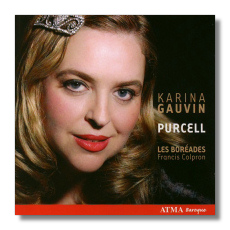
The Internet's Premier Classical Music Source
Related Links
- Purcell Reviews
- Latest Reviews
- More Reviews
-
By Composer
-
Collections
DVD & Blu-ray
Books
Concert Reviews
Articles/Interviews
Software
Audio
Search Amazon
Recommended Links
Site News
 CD Review
CD Review
Henry Purcell

Songs
- Come, ye sons of art, away, Z 323: Strike the Viol, touch…
- From Dido and Aeneas, Z 626: Thy hand, Belinda…When I am laid in earth
- From Don Quixote, Z 578: From rosie bow'rs
- From Fairy Queen, Z 629: Act 2 Prelude; Act 3, Overture – Symphony, while the swans come forward; First Musick, Prelude; Hark! The echoing air; If love's a sweet passion; Now the night is chas'd away; One charming night; See, even night herself is here; Act 3, Hornpipe
- from King Arthur Z 628: Air; Chaconne; Fairest Isle; Hither, this way; How blest are shepherds; Shepherd leave; Trumpet Tune
- Now that the sun hath veiled his light, Z 193 "Evening Hymn on a Ground"
- Oedipus, Z 583: Music for a while
Karina Gauvin, soprano
Les Boréades de Montréal
Francis Colpron
Atma Classique ACD2-2398
This CD is as much a showcase for the mellow and full singing style of Karina Gauvin as for the music of Purcell. She has recorded composers from Purcell and Bach to Puccini, Ives and Martin and her open, rich sound may be just a little too close to 'bel canto' to please all listeners. If, however, you take the view that the goal of such performances as these is not to recreate the way they might have been sung in the late seventeenth century, but to honor some of the most wonderful songs written in English, you probably won't be disappointed by Gauvin's very forward and expressive approach.
The selection is varied: items from Purcell's only real opera, 'Dido and Aeneas', from 'Don Quixote', 'The Fairy Queen' and 'King Arthur' as well as a handful of 'free-standing' songs – all of them well known and all stunning. If this set of 21 otherwise unconnected items points listeners who are new to Purcell's gorgeous tonalities and melodic invention towards the complete works, this CD should be given a chance. It would be interesting to see how Gauvin handled, say, Dido in her entirety.
In addition to being special for having worked in every musical medium current in the second half of the seventeenth century, Purcell made particularly striking use of the tones and subtlety of the English language of his time. It's well, then that Gauvin's articulation and modulation by and large respect and sustain this facet of the material which she has chosen to sing: every syllable is clear even if – at the end of the longest item on this CD, the 'From rosie bow'rs', for example – it's a little emphatic and over-flourished. Nor is there always the contrast one expects… the entry of 'Alleluia' in 'An Evening Hymn', for example, works best when it is sung so as to 'cap' everything that's gone before. Here it merely follows.
The playing of Les Boréades de Montréal on period instruments is supportive without losing the spring and 'fruitiness' needed to send those shivers up and down one's spine at Purcell's chromaticism. It's a dozen-strong ensemble of winds and strings with a harpsichord/portative organ. This is consistent with the forces Purcell asked for in his five late theatrical scores or 'semi-operas'. The whole works well in accompanying the solo singing here. But accompaniment it is: Gauvin is definitely to the fore and the more prominent sound. Les Boréades do have tracks to themselves, which are tight and 'courtly'. Listen to the prelude to the 'Fairy Queen' for their delicate and restrained technique, so much so that those used to Purcell's more earthy side might find it lacking in vigor. The instrumentalists are as far from imposing a romantic gloss on the music as one feels at time Gauvin would like to be.
The CD booklet has a brief introduction to the musical and (where relevant) literary context of each song as well as background to Karina Gauvin and Les Boréades with the songs' full texts. Although it won't be the first choice for everyone who wants to explore historically-informed Purcell or – clearly – who wants to experience the complete 'Fairy Queen' and 'King Arthur' (for those try Gardiner DG 419221 and Erato 96552) etc. Nor is it really a recital in the usual sense. But as a varied sampler and vehicle for the rounded singing of Karina Gauvin, it is well worth investigating.
Copyright © 2007, Mark Sealey




















